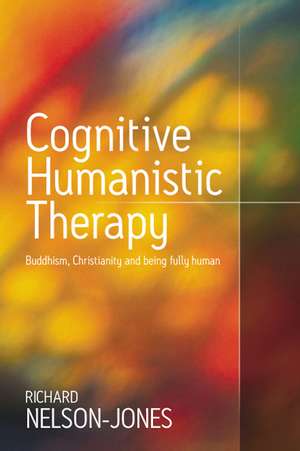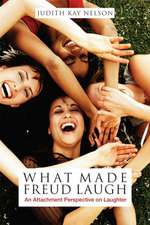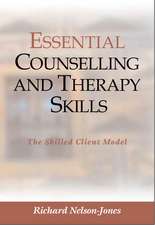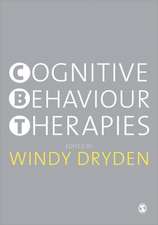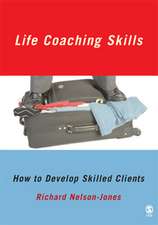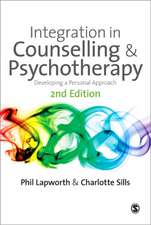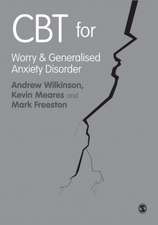Cognitive Humanistic Therapy: Buddhism, Christianity and Being Fully Human
Autor Richard Nelson-Jonesen Limba Engleză Paperback – 30 mar 2004
`An intriguing book, full of surprises and unexpected insights into the human condition and the work of therapists. It offers practical resources for retreat conductors and spiritual accompaniers, with a comprehensive account of current counselling and psychotherapy practice. Working alongside Buddhists in Thailand, Richard Nelson Jones provides suggestions for living more fully, and suggests a variety of therapeutic interventions, based largely on Buddhist concepts, to make this possible' - Retreats, Quaker Retreat Group
`A very informative and useful book for religious practitioners and others' - Reverend John Butt, Director, Institute for the Study of Religion and Culture, Payap University, Thailand
`Richard Nelson-Jones is one of the few scholars with the erudition and breadth of experience necessary to link Christian and Buddhist traditions in the helping professions. This is much more than old wine in new bottles, and this book will introduce counsellors and therapists to new and better ways of understanding and helping the clients we treat' - Danny Wedding, Missouri Institute of Mental Health
Cognitive Humanistic Therapy describes a new approach to psychotherapy and self-development, based on an understanding of what it means to be "fully human". In a unique integration of theory and practice, the book synthesises ideas from the cognitive and humanistic domains of psychotherapy and the religious worlds of Buddhism and Christianity.
Written by bestselling author, Richard Nelson-Jones, Cognitive Humanistic Therapy explores the idea of being 'fully human' as a central goal of human existence, one which has traditionally been the province of religion. In this book, he examines ways in which psychotherapy and personal practice can help individuals develop in both their capacity to reason and their capacity to love.
Beginning with the theoretical underpinnings of the Cognitive Humanistic perspective, the book goes on to show how clients can become equipped with the skills to tackle negative reactions and develop positive attributes such as goodwill, gratitude, compassion, equanimity, generosity, helping and service.
This book presents a powerful new interpretation of the role of psychotherapy, which will be of interest to psychotherapists, counsellors, their clients, and also to religious people.
Preț: 474.11 lei
Preț vechi: 499.05 lei
-5% Nou
90.78€ • 94.53$ • 75.32£
Carte tipărită la comandă
Livrare economică 14-28 februarie
Specificații
ISBN-10: 1412900751
Pagini: 264
Dimensiuni: 156 x 234 x 17 mm
Greutate: 0.41 kg
Ediția:First Edition
Editura: SAGE Publications
Colecția Sage Publications Ltd
Locul publicării:London, United Kingdom
Recenzii
Cuprins
What Is Cognitive Humanism?
Human Motivation
Human-Being Skills
Being Fully Human
Learning and Losing Humanity
PART TWO: CULTIVATING BEING FULLY HUMAN
Overview of Cognitive Humanistic Therapy
The Skilled Client Model
Calming and Disillusioning the Mind
Awakening the Heart
Curbing Anger and Aversion
Curbing Greed and Craving
Cultivating Goodwill, Sympathetic Joy and Gratitude
Cultivating Compassion and Equanimity
Cultivating Generosity, Helping and Service
Personal Practice
Notă biografică
In 1984, he took up a position as a counselling and later counselling psychology trainer at the Royal Melbourne Institute of Technology, where he became an Associate Professor. He continued writing research articles, articles on professional issues and books, which were published in London and Sydney. As when he worked at Aston University, he also counselled clients to keep up his skills. In 1997, he retired from RMIT and moved to Chiang Mai in Thailand. There, as well as doing some counselling and teaching, he has continued as an author of counselling and counselling psychology textbooks. A British and Australian citizen, he now divides his time between Chiang Mai and London and regularly visits Australia.
Descriere
Cognitive Humanistic Therapy describes a new approach to psychotherapy and self-development, based on an understanding of what it means to be "fully human". In a unique integration of theory and practice, the book synthesises ideas from the cognitive and humanistic domains of psychotherapy and the religious worlds of Buddhism and Christianity.
